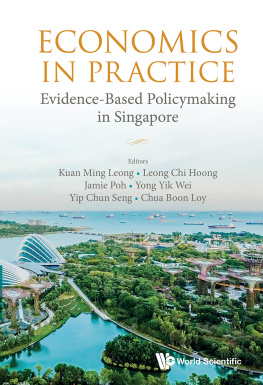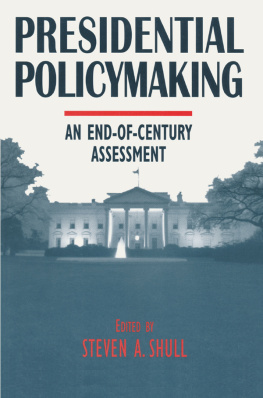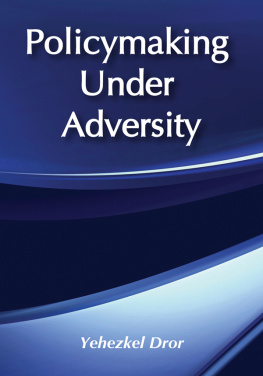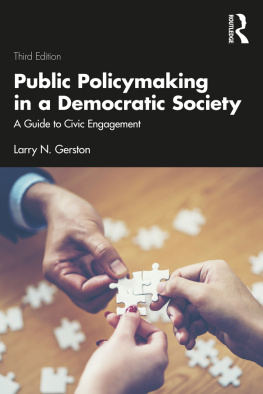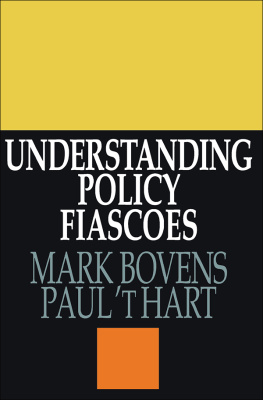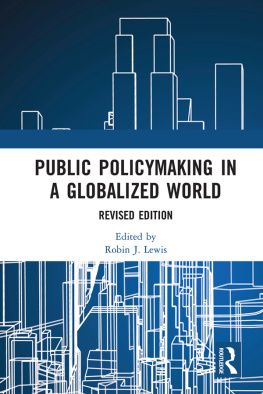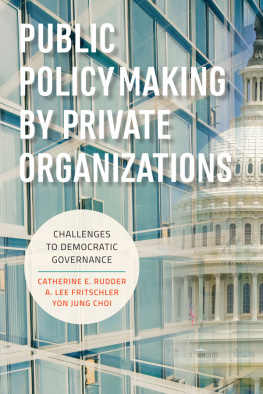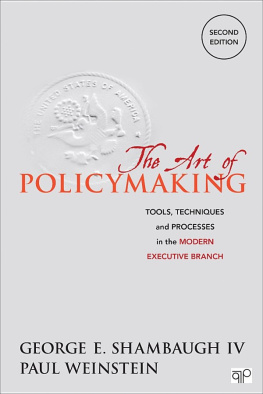First published 1987 by Transaction Publishers
Published 2017 by Routledge
2 Park Square, Milton Park, Abingdon, Oxon OX14 4RN
711 Third Avenue, New York, NY 10017, USA
Routledge is an imprint of the Taylor & Francis Group, an informa business
All rights reserved. No part of this book may be reprinted or reproduced or utilised in any form or by any electronic, mechanical, or other means, now known or hereafter invented, including photocopying and recording, or in any information storage or retrieval system, without permission in writing from the publishers.
Notice:
Product or corporate names may be trademarks or registered trademarks, and are used only for identification and explanation without intent to infringe.
Library of Congress Catalog Number: 86-30738
Library of Congress Cataloging in Publication Data
Vickers, Geoffrey, Sir, 1894-
Policymaking, communication, and social learning.
Bibliography: p.
1. Policy sciences. 2. Communication. 3. Social values. 4. Professions. I. Adams, Guy B. II. Forester, John. III. Catron, Bayard L. IV. Title.
H97.V53 1987 361.1 86-30738
ISBN 0-88738-115-4
ISBN 13 : 978-0-88738-115-7 (hbk)
My friends, the editors, initiated the idea of this book and it is they who have done virtually all the work of selecting and editing its contents from a collection of my papers. My first and most welcome task is to thank them for the trouble they have taken, the courtesy they have shown in keeping me in touch with their enterprise, and the assurance they have given me that they have found something useful in my writing and believe that even the earliest pieces they have chosen still have a relevance wide enough to warrant another publication.
I have learned how hard it is for a would-be communicator to guess what effect, if any, his communication will have on any receiver, for this depends on the usually tacit assumptions that both parties bring to the marvelous and obscure process of sharing each others understanding of some situation and even of changing their own and each others underlying assumptions in the process. This involves dialogue; where that is impossible, the one-way communicator can do no more than make explicit, so far as he or she can, the concerns that have goaded him or her to utterance and the assumptions and perceptions that have aroused them. It may therefore be useful if I outline the experiences that have led me to seek so obsessively a better understanding of the changing concept of order in human life.
I grew to manhood before the First World War in an England that took stability for granted and regarded ordernational and internationalboth as a self-regulating process of betterment called progress and also as a field for human design directed to the same end. These two not wholly consistent ideas applied in the political-social, the financial-economic, and the scientific-technological fields; all these fields are regarded as benign partners, the first still the most prized.
Of the thirty years following 1914 ten were spent in intensive warfare and twenty in the vain search for both national and international stability. By 1944 all my early assumptions were shaken, if not destroyed. Stability could not be taken for granted, could not even necessarily be assured by even the greatest conscious effort. Still, neither automatic regulation nor human design could be trusted to achieve betterment by any of the diverse criteria that had emerged.
Worse was to come, but before it came an event occurred in the intellectual world that had a profound effect on me. In the decade following the war, a set of concepts about systems and their control that had been maturing in technological contexts during the previous decade was set loose in the general intellectual community by such writers as Norbert Wiener, Ludwig von Bertalannfy, and Ross Ashby. The effect on me was not so much revelation as liberation. The ideas did not seem surprising or even new, but they provided a new language in which to talk about the perplexing experience of my lifetime and a new point of view from which to regard it. The result was immensely illuminating. The relation between stability and betterment, the nature of the dialectic process of history, the extent of human initiative in influencing the course of a process of which it was itself part, the inescapable increase in constraint as well as enablement in every increase in organization, all this and much more, previously sensed chiefly as paradox, became understandable and discussable. I did not assume that this would make human affairs more controllable; but even if it did not, we should, I thought, be much the better for understanding the limits and conditions of human control.
It would, I hoped, greatly increase our understanding of the part played by different cultures in affecting the ways in which the members of each appreciated their own situation and that of others, however numerous and overlapping the groups which these cultures and subcultures definedbe they national, racial, occupational, social or of any other kind. For cultures, even the smallest subcultures, are preeminently systems, which give rise to the type of question illustrated in the previous paragraph and which can be understood only in systemic terms.
Inevitably and rightly there arose an intense concern to formulate a general systems theory. Inevitably, but in my view disastrously, this focussed attention on systems of which the elements and interactions could be fully described, if not actually designed. Consequently those human systems which could not be described or designed were either ignored or over-simplified. This tendency was intensified by the startling development of the digital computer. I recall all these developments because those who did not experience the intellectual excitement of those early days may not realize how greatly systems theory has improved our understanding even of those aspects of human systems where we are least able to quantify or even to specify the essential elements or their interactions, still less to exercise any effective control or to model with any precision. We know, for example, far more about the generation of urban traffic than about the generation of urban crime. But systems thinking is as necessary and as illuminating in the second area as in the first, if only for its aid in distinguishing a symptom from a more basic disorder.
Norbert Wieners symbolic helmsman takes his course as given, as does the technological problem solver take his problem as given. But the greatest importance of control theory in the human field, in my view, is that it points beyond problem solving to the far deeper question of problem setting. It also extends beyond that to the human concerns and appreciations which construct problematic situations and define standards of what should be regarded as success in dealing with them. Without these there would be neither problems nor solutions.
Human order is not to be described in biological or ecological terms alone, though it is obedient to the laws of both these disciplines. T. H. Huxley, Darwins champion, insisted that biological evolution had set in motion in man a new and different form of evolution that was both social and ethical. A human society was as different from a state of nature as a garden was from the Amazon jungle. A new selector had evolved whose task was to create in opposition to the State of Nature the State of Art of an organized polity capable of maintaining and constantly improving itself.


